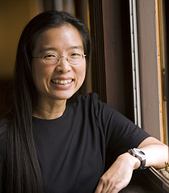

Anthropology Prof. Vanessa Fong received her B.A. at Amherst College, where she majored in Anthropology and graduated summa cum laude in 1996. She completed her M.A. and Ph.D. at Harvard Univ. She worked as a postdoctoral fellow at the Univ. of Michigan, Ann Arbor and as an associate professor at Harvard Univ. before returning to the College.
Q: How did begin studying anthropology and what made you decide to pursue it?
A: I grew up in the United States, but had a strong personal desire to spend time living in China and learn more about the society my parents and many of my childhood friends came from, and the more I learned about China in classes I took at Amherst College, the more fascinated and curious I became from an intellectual perspective. When I took my first anthropology class, “Introduction to Social Anthropology,” with Deborah Gewertz, I decided right then that I wanted to be her when I grew up. The anthropological perspectives I learned opened my eyes to how the world really worked, and anthropology seemed like the ideal discipline to help me learn about China, help the world to understand China and help people in China understand themselves and each other. I knew then that I had found my calling.
Q: Why did you decide to teach at Amherst?
A: I wanted to come “home” to Amherst, to work with the professors who inspired me to become a professor and guide students going through experiences that I and the Amherst College alumni who are still among my closest friends also went through. I loved my time as an Amherst College student, so coming back as a professor is very appealing.
Q: What is you research on and how did you become interested in it?
A: My doctoral dissertation grew out of my Amherst College thesis about gender in China. I learned during my senior thesis research that a lot of the previous scholarship attributed gender inequality in China to the fact that parents favored sons over daughters. That made me wonder what would happen to daughters with no brothers. So I decided to focus my doctoral dissertation research on gender roles among adolescents born under China’s one-child policy. I began my longitudinal research by teaching English at a junior high school, a college prep high school, and a vocational high school in China, surveying 2,273 of the students at those schools, and doing participant observation in their schools and some of their homes. I found that urban girls were much more empowered than their mothers and grandmothers, and could compete on a fairly level playing field with boys in the educational system, but also that the biggest concerns of boys, girls and their parents were not about gender inequalities, but about educational and socioeconomic inequalities and inequalities between China and the developed world. So then I studied those issues as well, and I’m still studying all these issues and other issues of childbearing, childrearing, education, consumption, transportation and transnational migration that have come up as those I first surveyed in 1999, when they were age 13-20, move through the life course and raise children of their own.
Q: Are you currently working on publishing anything, or have you published anything before?
A: You can find the list of my previous publications here: http://www.vanessafong.blogspot.com/
I’m currently working on publishing my most recent findings from my longitudinal study about childrearing in China.
Q: What aspects of Amherst do you like so far?
A: I was looking forward to teaching students who could engage in the kinds of intense and exciting class discussions I remember from my undergrad days, and my students have done that, but also surpassed my expectations. My students are as smart and curious as I remember my own Amherst College classmates were 16 years ago, but now they are more diverse in so many ways — ethnically, culturally, socioeconomically, linguistically, internationally, intellectually and in terms of knowledge, lifestyles and life experiences. They have a lot to teach each other and me, and that’s wonderful for anthropology classes, where we talk about how to make sense of similarities and differences between diverse experiences.
Q: What do you hope to contribute to Amherst during your time here?
A: I hope to inspire a lot of students to learn more about China, anthropology and processes of education and human development, and teach them research, analysis, writing, speaking and collaboration skills that will help them do well in other classes, in whatever professions and fields they go into, and in their efforts to understand the meaning of life for them and for others. I plan to continue working on my longitudinal research project in China for the rest of my life, and I hope findings from my project will help people in China and worldwide improve their lives. I hope to integrate my research and teaching, and do collaborative and comparative work with students and colleagues.
Q: What do you like to do in your spare time?
A: I don’t have a lot of spare time! On the rare occasions when I have spare time, I like to surf the internet and take walks if the weather is nice.